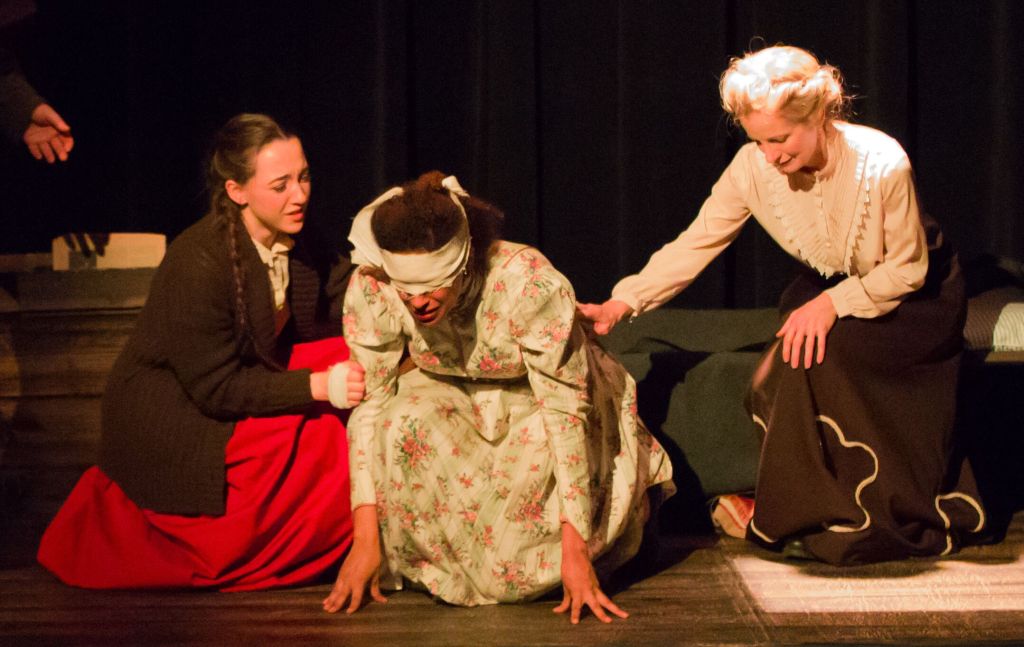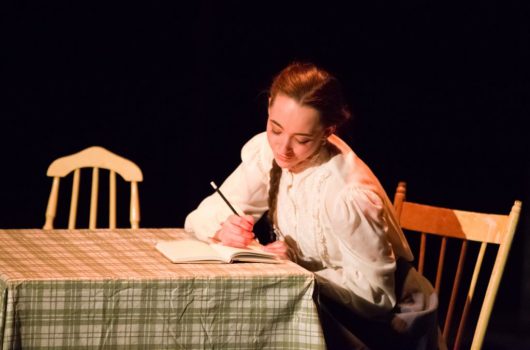REVIEW: Shatter goes behind Halifax Explosion
Posted on December 7, 2017 By Colin MacLean Entertainment, Front Slider, Theatre
 Early in the morning of December 6, 1917, the residents of Halifax were awakened by steam whistles hooting loudly in the harbour. The French cargo ship S.S. Mont-Blanc was slowly approaching the Norwegian vessel the S.S. Imo. Neither would give right-of-way. The inevitable collision, as if in slow motion, happened at 8:45 am. The Mont-Blanc burst into flames, attracting a large crowd to the docks. Since no ship was allowed to carry munitions into a harbour, no one suspected that the Mont-Blanc carried a cargo of high explosives. But it was wartime, and rules were fluid. Kids got on their bikes and rode down to see the event. Haligonians stood in their windows and watched.
Early in the morning of December 6, 1917, the residents of Halifax were awakened by steam whistles hooting loudly in the harbour. The French cargo ship S.S. Mont-Blanc was slowly approaching the Norwegian vessel the S.S. Imo. Neither would give right-of-way. The inevitable collision, as if in slow motion, happened at 8:45 am. The Mont-Blanc burst into flames, attracting a large crowd to the docks. Since no ship was allowed to carry munitions into a harbour, no one suspected that the Mont-Blanc carried a cargo of high explosives. But it was wartime, and rules were fluid. Kids got on their bikes and rode down to see the event. Haligonians stood in their windows and watched.
At 9:04 am the Mont-Blanc blew up. Two thousand people died immediately in the explosion, followed by fires and a huge tsunami. Buildings were obliterated to a radius of 800 meters. White hot shards of iron fell on Dartmouth and Halifax. My father was preparing to give a class when the ceiling fell in on him and he jumped under a desk.
 It was the largest-man made explosion before Hiroshima.
It was the largest-man made explosion before Hiroshima.
Vancouver playwright Trina Davies has used this disaster as the basis for Shatter, a new play now in production at the Walterdale Theatre until Dec. 16. Its opening night here was exactly one hundred years after the explosion.
In 1917, Halifax was a jumping off harbour for the dangerous voyage to Europe for ships carrying supplies and personnel. Rumours were rampant – newspaper headlines screamed that the “Huns” were about to attack any day. When the two ships blew up in the harbour most people thought it was the invasion.
Davies takes a group of Haligonians and places them in the middle of the explosion. At the centre is teenager Anna (Sian Godsmark) who lives with her mother, Jeannie (Yanit Terefe), and her young brother. Their best friend is Elsie (Samantha Woolsey), a German widow. Anna has the usual gang of friends and a special new one – Brian (Dylan Brenneis), a soldier.
The explosion, with its staggering statistics of death and destruction, is well staged in the dark with flashlights by director Josh Languedoc. The cast is joined by a ghostly group of bodies known as “shadows.”
 After the explosion Anna’s mother is blinded, her brother and many of her friends are killed. The play probes what happens to a community when they are in distress and completely cut off from all information – except for those blatant, rabble rousing headlines (”Huns Responsible for Explosion!”). The headlines, rendered in slides, continue stirring up hatred in the throngs throughout the play.
After the explosion Anna’s mother is blinded, her brother and many of her friends are killed. The play probes what happens to a community when they are in distress and completely cut off from all information – except for those blatant, rabble rousing headlines (”Huns Responsible for Explosion!”). The headlines, rendered in slides, continue stirring up hatred in the throngs throughout the play.
There are tales of German armies on the beaches. Elsie is stoned in the streets. Gangs of rampaging citizens roam the streets at night wrecking what is left of German homes. Anna joins in – with the urging of Brian who believes all the hateful propaganda. Languedoc makes good use of a chorus, effectively using the flashlights, occasionally creepily shining them upward into their mask-like faces.
There’s not a glimmer of humour, and not a lot of hope here, as you might imagine from the subject matter. The blinded Jeannie spends her time in bed or blundering around the room where the family has found haven. At one point, when she finds her son has died, she raises her fist and cries out to God, “Why have you taken everything?” Elsie is accused of being a spy. Anna is torn between both sides and doesn’t know what to think. “Since the police arrested all German nationals – there must be something to the rumours!” she says. But, at least for her, love blossoms amidst the ruins, although the waffling, hate-filled Brian doesn’t seem like much of a catch.
The game cast gives everything they have to a script that only sporadically grips or involves us. But the events depicted here, with their terrible consequences and ghastly statistics (9,000 injured – hundreds blinded by the flash) command a certain amount of awe and the play taps into them.
The entire evening revolves around Anna, who is not only coping with the aftermath of the explosion, but with teen hormones as well. Godsmark handles it with considerable skill.
As for the ravening crowds, well, they give up on the Huns and decide that it was all a French plot to get les Anglais for conscription.
Photos by Englandan C











